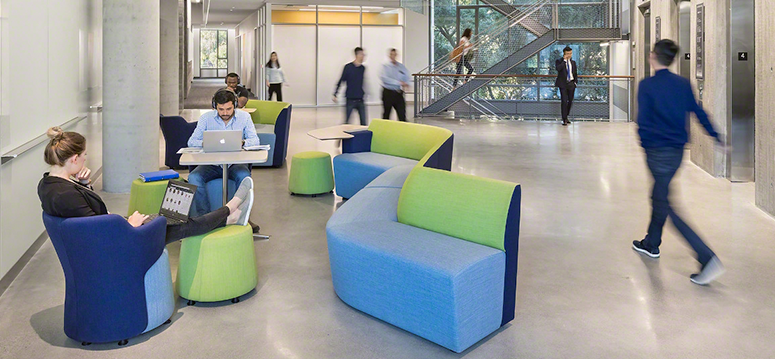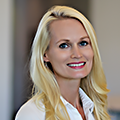
It’s Not About the Office. It’s About the People.
Right now the hot topics in business, and especially in real estate and design circles, revolve around “the return to the office”, “the future of workplaces” or how the pandemic will change the ways we socialize, collaborate and connect. Guides, blogs, videos and presentations abound recommending the best ways to virus-proof our workplaces, highlighting product solutions, and suggesting a myriad of new protocols to adopt for increased safety. Of course these are important topics to consider – they’re practical, logical and as businesses and people, we do need to make decisions about how and when we will “return” and what our environments will look like and how we will act when we do. And considering my business is primarily focused on the places where people work, learn and receive or give care, of course I am thinking about these things as well.
But lately, I’ve found myself thinking much more about something else. Specifically, someone/s else….my people.
The amount of pressure that the pandemic is applying to people all over the globe is unprecedented. Millions of families have suddenly found themselves without childcare and thrust into the impossible situation of somehow working productively from home while also providing care and/or instruction to their children. Many have also lost businesses, jobs, income, and benefits, or are living in fear that they will, as businesses in nearly every industry batten down the hatches in an attempt to weather the economic storm. Others are plagued with fear for their family members, or themselves, who may be at increased risk from Covid-19, or who are serving on the front lines in the many industries and roles that continue to go to work for the sake of the rest of us. Far too many have suffered the loss of a loved one. And layered amidst all that is an undercurrent of mourning, anger and sadness for the ways our country has failed our BIPOC communities.
In other words: we worry.
We worry for our children, our parents, our friends, our neighbors. We worry for our businesses, our employees, our co-workers, our partners. We worry for our communities. We worry for our futures. We worry for ourselves.
And the weight of that worry is a lot to carry. It’s a heavy load upon the shoulders of our people – the very people who are the reason our buildings, our offices, our businesses exist, and the same people who we are now preparing to welcome back, who we are making preparations for.
What I’m wondering is, how many of us are spending as much time thinking about the people as we are the virus?
Of course, it’s important to minimize risk where possible, to create new processes and protocols that reduce the spread of illness and to consider all the ways in which the workplace can be safer. But more than anything right now, I’m worried about the worry. Worry, anxiety, stress – they put strain on our bodies and minds. They keep us from being our best selves, from being productive, from being happy. And they badger our bodies, affecting our heart rate, our breathing, our blood pressure, our immune system, our cognition and our emotional response. Worry makes us sick.
And while everyone’s situation and level of worry is not the same, I know that all the people on my team continue to be under high levels of stress. They’re juggling childcare, elder care and self-care. They’re anxious and uncertain about the future. They’re lonely, frustrated and missing fulfillment of the oh-so-human need for connection, socialization and physical touch. They’re mourning for what we used to call “normal” – summer months filled with street fairs, concerts, cookouts, baseball games, church picnics, pool days and festivals. They’re feeling guilty for missing those things so deeply when others are missing so much more. They’re grappling with the idea of a new future, one none of us can even yet begin to predict. And as much as we all long to “go back to normal”, we know that ‘normal’ is still a bit out of reach. As long as that remains so, what I’m focused on as I think about the “return to the office”, is empathy.
I’m focused on understanding what each of my people need and what their own individual situation is like. I’m focused on what ‘returning’ means to them personally, how they are managing stress and anxiety and what they value most in this next phase of working through a pandemic. I’m thinking about how I can best show them I care, that I understand, and that I’m here to support them. I want to help them feel comfortable sharing their worries, find ways to reduce their stress, and assure them that they’ll continue to have flexibility to manage through this time. I want them to know that I understand that the pandemic and its fallout look different to everyone, and that comfort with returning to old habits will be found in different stages, at different times, for everyone.
This practice of empathy, of understanding, and of flexibility is at least equally as important as creating physically safer work environments. People who feel understood, heard and supported are much healthier and happier – and it just so happens, they’re generally more invested, engaged and committed to the work they do and to their team as well.
So yes, let’s improve our environments in sensible ways to reduce disease transmission wherever possible, but, please, let’s also improve the way we lead and manage people. If we bring empathy into the fold and lead with a people-centric focus, all of us, and our businesses, will be healthier.
Written by:

Elizabeth Lewis
VP, Sales and Space Solutions
